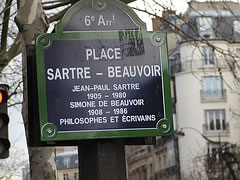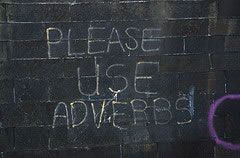5. Solved Exercise
Now, we know that Paco has been lucky and has won the lottery. He wants to put his money in a bank. While he was waiting for an interview with a bank manager, he read in a newspaper part of an old interview to Jean-Paul Sartre's wife, Simone de Beauvoir, who was also a famous French writer and philosopher. In this interview she talks about his habits, routines and likes and dislikes.
INTERVIEWER
People say that you have great self-discipline and that you never let a day go by without working. At what time do you start?
DE BEAUVOIR
I'm always in a hurry to get going, though in general I dislike starting the day. I first have tea and then, at about ten o'clock, I get under way and work until one. Then I see my friends and after that, at five o'clock, I go back to work and continue until nine. I have no difficulty in picking up the thread in the afternoon. When you leave, I'll read the paper or perhaps go shopping. Most often it's a pleasure to work.
INTERVIEWER
When do you see Sartre?

|
| By sarutora Creative Commons |
DE BEAUVOIR
Every evening and often at lunchtime. I generally work at his place in the afternoon.
INTERVIEWER
Doesn't it bother you to go from one apartment to another?
DE BEAUVOIR
No. Since I don't write scholarly books, I take all my papers with me and it works out very well.
INTERVIEWER
Do you plunge in immediately?
DE BEAUVOIR
It depends to some extent on what I'm writing. If the work is going well, I spend a quarter or half an hour reading what I wrote the day before, and I make a few corrections. Then I continue from there. In order to pick up the thread I have to read what I've done.
INTERVIEWER
Do your writer friends have the same habits as you?
DE BEAUVOIR
No, it's quite a personal matter. Genet, for example, works quite differently. He puts in about twelve hours a day for six months when he's working on something and when he has finished he can let six months go by without doing anything. As I said, I work every day except for two or three months of vacation when I travel and generally don't work at all. I read very little during the year, and when I go away I take a big valise full of books, books that I don't have time to read. But if the trip lasts a month or six weeks, I do feel uncomfortable, particularly if I'm between two books. I get bored if I don't work.
From The Paris Review, Issue 34, Spring-Summer 1965
As we can see, when talking about her habits and routines she uses the Present Simple tense. Let's have a look at some of the sentences she says in the interview.
| Habits / Routines |
I first have tea At about ten o'clock, I get under way and work until one I generally work at this place in the afternoon Then, I see my friends After that, at 5 o'clock, I go back to workI work every day |
| Like / Dislikes | In general I dislike starting the day |
| Generalities |
I don't write scholarly books
I get bored if I don't work |
Simone changes on some occasions the common order of some words in the sentence, but those changes do not affect the structure of the sentences. Let's see the order she uses in some of the sentences
| (When) / (How) | Subject | (Adverb) | Verb |
(Indirect Object) |
(Direct Object) |
(How) | (Where) | (When) |
| I | first | have | tea | |||||
| At about ten o'clock, | I | get under way and work | until one | |||||
| I | generally | work | at this place |
in the afternoon | ||||
| Then, | I | see | my friends | |||||
| After that, at 5 o'clock |
I | go back to work | ||||||
| I |
work | every day | ||||||
| In general | I | dislike | starting the day | |||||
| I |
don't write |
scholarly books |
||||||
| I |
get | bored |
||||||
| I |
don't work |
So, the structure of English sentences is quite fixed. We always need a subject, for example. Otherwise, we would never know who does the action since inflections in verbs (except in the third person singular of the Present Simple) were dropped in Middle English. Apart from that, we need the auxiliary verb to do (third person singular: does) to say negative sentences in the Present Simple tense (except with modal verbs and the verb to be).
Now, we are going to work as journalists, and we are going to narrate one of Simone's answers.
